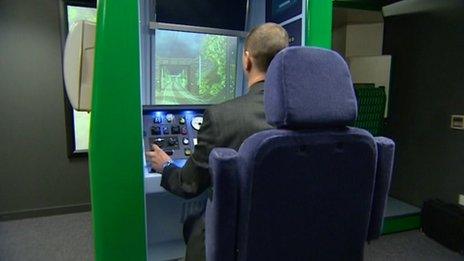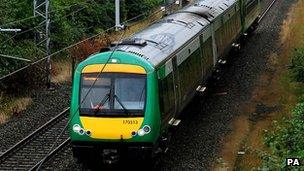London Midland: Train drivers' union blames pay levels
- Published

Simulators are used to test how trainee drivers react to emergencies.
Delays caused by London Midland's ongoing driver shortages have happened because other train operators in the West Midlands "pay substantially more", according to the Aslef union.
The drivers' union has been working with London Midland over the amount of overtime its members can work to cover the shortage but said this was only a "temporary solution".
Simon Weller, from Aslef, said: "Across the concourse [at Birmingham New Street] they've got CrossCountry who pay substantially more.
"Their work is more interesting, it's less of the suburban type of stuff.
"It is very, very attractive, so London Midland is losing their drivers."
Mr Weller also said London Midland will train people with no previous experience while CrossCountry employ "qualified drivers".
A spokesman for CrossCountry said: "While we don't take on untrained drivers we do have to train any we recruit to use the types of trains we operate and to familiarise them with the routes."
The Rail, Maritime and Transport Union (RMT) claimed last month 31 London Midland drivers had recently joined other operators for better pay and conditions.
High failure rate
Steve Male, who is undergoing the year-long training course necessary before he can drive a London Midland train, said the training was very "safety critical".
"You are responsible for thousands of people's lives every day and you can't take any risks," he explained.
It is the length of time it takes to train a driver that London Midland blames for the more than 500 trains it had to cancel or alter in October.
The train operator has said the number of drivers who had left lately had been "far larger than planned".
The mathematics is that drivers have to give three months notice before they can leave but it takes a year to train their replacement.
Would-be drivers have to undergo physical and psychometric tests before they can even begin to train.
Mr Weller, national organiser for Aslef, said there was a "very high failure rate".
"The psychometric tests measure whether an individual is capable of taking instruction and their ability to concentrate and do system-type tasks," he said.

Aslef figures reveal London Midland pays drivers less than other rail firms
He said trainees were expected to be a competent driver after 250 hours of driving accompanied by an instructor.
They also had to master the rules and regulations that govern safety on the railway.
Mr Weller said simulators were used to test how trainees respond in an emergency.
"The simulators are quite realistic and it puts the individuals under quite a bit of pressure," he said.
He was a driver for 25 years and still remembers how big the train cab seemed the first time he was in it on his own.
"It was very nerve wracking because you are responsible for several thousand horsepower and a lot of people," he said.
Twitter response
Shropshire commuter Ben Whitehouse probably hears more complaints than most about the train company's problems.
Mr Whitehouse travels every day on London Midland's Shrewsbury-Wolverhampton-Birmingham service and, after tweeting about his own problems, external of overcrowded trains and delayed and cancelled services, became what he said was "almost a counselling service" for other frustrated commuters.

The company cancelled or altered more than 500 trains in October
The commuter, better known to his 1,300 followers on Twitter as @benjionthetrain, said using social media had produced a "community" for equally disheartened travellers.
"When people are stuck on a delayed train, they have time and can whip out their phone to take photos and video of any overcrowded services they're on and complain publicly," he said.
"London Midland are very good on Twitter, and passengers can then get a real-time response - and maybe an apology - if they tweet them."
However, he said the instant apologies often appeased travellers to an extent they then did not bother to make formal complaints.
"When the government comes to looking at who runs franchises in the future, they'll be looking at the numbers of official complaints and passenger satisfaction survey results, rather than how many people have contacted London Midland via Twitter," he added.
"It's really important that as well as tweeting them, people make those official complaints and register the issues on a website like fixmytransport.com where lots of people can club together to add weight to any service problems as a group."
Mr Whitehouse said in the future it could be worth investigating whether a passenger-run co-operative could take on an entire rail franchise itself.
He added: "I would be willing - and I suspect many others would be too - to put money into knowing a service would be run for the passengers rather than advancing revenues or shareholders' profits."
- Published3 November 2012
- Published1 November 2012
- Published31 October 2012
- Published23 October 2012